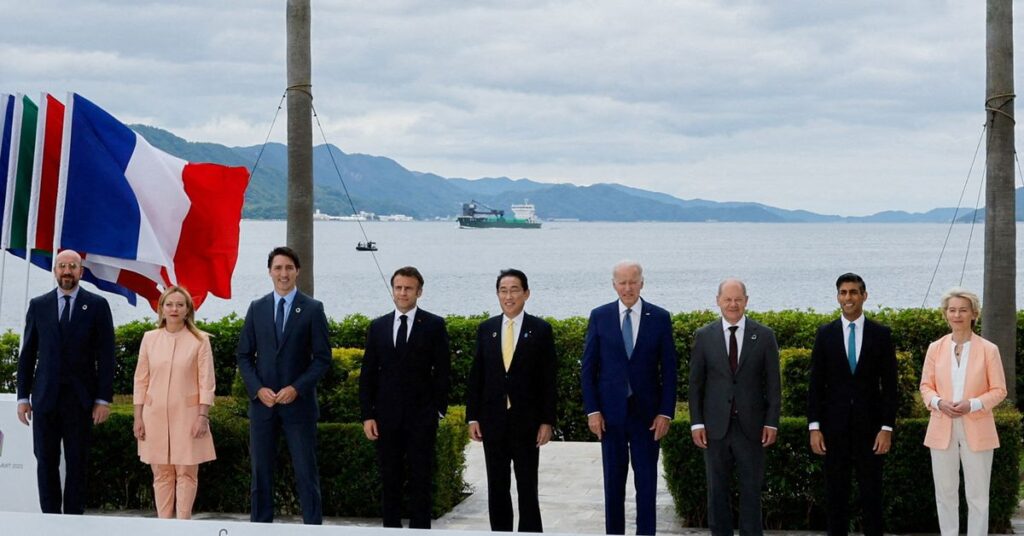May 20 (Reuters) – Leaders of the Group of Seven (G7) agreed on Saturday to establish an initiative to counter economic “coercion”, pledging to take steps to ensure that any actors attempting to “weaponise” economic dependence would fail and face consequences.
The initiative, dubbed Coordination Platform on Economic Coercion, will use early warning and rapid information sharing on economic coercion with members meeting regularly for consultations, the G7 leaders, meeting in Hiroshima, Japan, said in a statement.
Below are excerpts from the statement.
“We are taking additional steps today to enhance our ongoing strategic coordination on economic resilience and economic security by reducing vulnerabilities and countering malign practices that exploit and reinforce them.
“We underline the importance of cooperating both within the G7 as well as with all our partners to enhance global economic resilience, including by supporting a more significant role for low and middle-income countries in supply chains… We will address non-market policies and practices designed to reinforce dependencies, and will counter economic coercion. We will continue to ensure that the clearly defined, narrow set of sensitive technologies that are crucial for national security or could threaten international peace and security are appropriately controlled, without unduly impacting broader trade in technology.”
RESILIENT SUPPLY CHAINS
“We recognise that transparency, diversification, security, sustainability, and trustworthiness and reliability are essential principles on which to build and strengthen resilient supply-chain networks among trusted partner countries both within and outside the G7. We encourage all nations to support these principles on resilient and reliable supply chains. We reaffirm our strong will to support the wider international community, particularly developing countries, in building their resilience, including through implementing the Partnership for Global Infrastructure and Investment.
“We will enhance resilient supply chains through partnerships around the world, especially for critical goods such as critical minerals, semiconductors and batteries. We will step up our efforts to strengthen channels of communication to address supply disruptions and share insights and best practices, including from respective scenario-based stress testing.”
COORDINATION PLATFORM
“The world has encountered a disturbing rise in incidents of economic coercion that seek to exploit economic vulnerabilities and dependencies and undermine the foreign and domestic policies and positions of G7 members as well as partners around the world. We will work together to ensure that attempts to weaponise economic dependencies by forcing G7 members and our partners, including small economies, to comply and conform will fail and face consequences. We express serious concern over economic coercion and call on all countries to refrain from its use, which not only undermines the functioning of and trust in the multilateral trading system, but also infringes upon the international order centred on respect for sovereignty and the rule of law, and ultimately undermines global security and stability.
“Recognising the importance of existing joint efforts including at the (World Health Organization), we will enhance collaboration by launching the Coordination Platform on Economic Coercion to increase our collective assessment, preparedness, deterrence and response to economic coercion, and further promote cooperation with partners beyond the G7. Within this Coordination Platform, we will use early warning and rapid information sharing, regularly consult each other, collaboratively assess situations, explore coordinated responses, deter and, where appropriate, counter economic coercion, in accordance with our respective legal systems. We will also coordinate, as appropriate, to support targeted states, economies and entities as a demonstration of solidarity and resolve to uphold the rule of law.”
DIGITAL SPHERE
“We express concern about regulations that unjustifiably require companies to localise data or those that allow governments to access data without appropriate safeguards and protections.
“We will therefore deepen our strategic dialogue to seek to counter malicious practices in the digital sphere to protect global value and supply chains from illegitimate influence, espionage, illicit knowledge leakage, and sabotage.
“We will further strengthen multilateral efforts to cooperate in the field of export controls to ensure gaps in our dual use technology protection ecosystem cannot be exploited. We have a common interest in preventing the narrow set of technological advances that are assessed to be core to enhancing the military and intelligence capabilities of actors who may use these capabilities to undermine international peace and security, from being fuelled by our companies’ capital, expertise, and knowledge.”
Reporting by Chang-Ran Kim; Editing by William Mallard
: .


